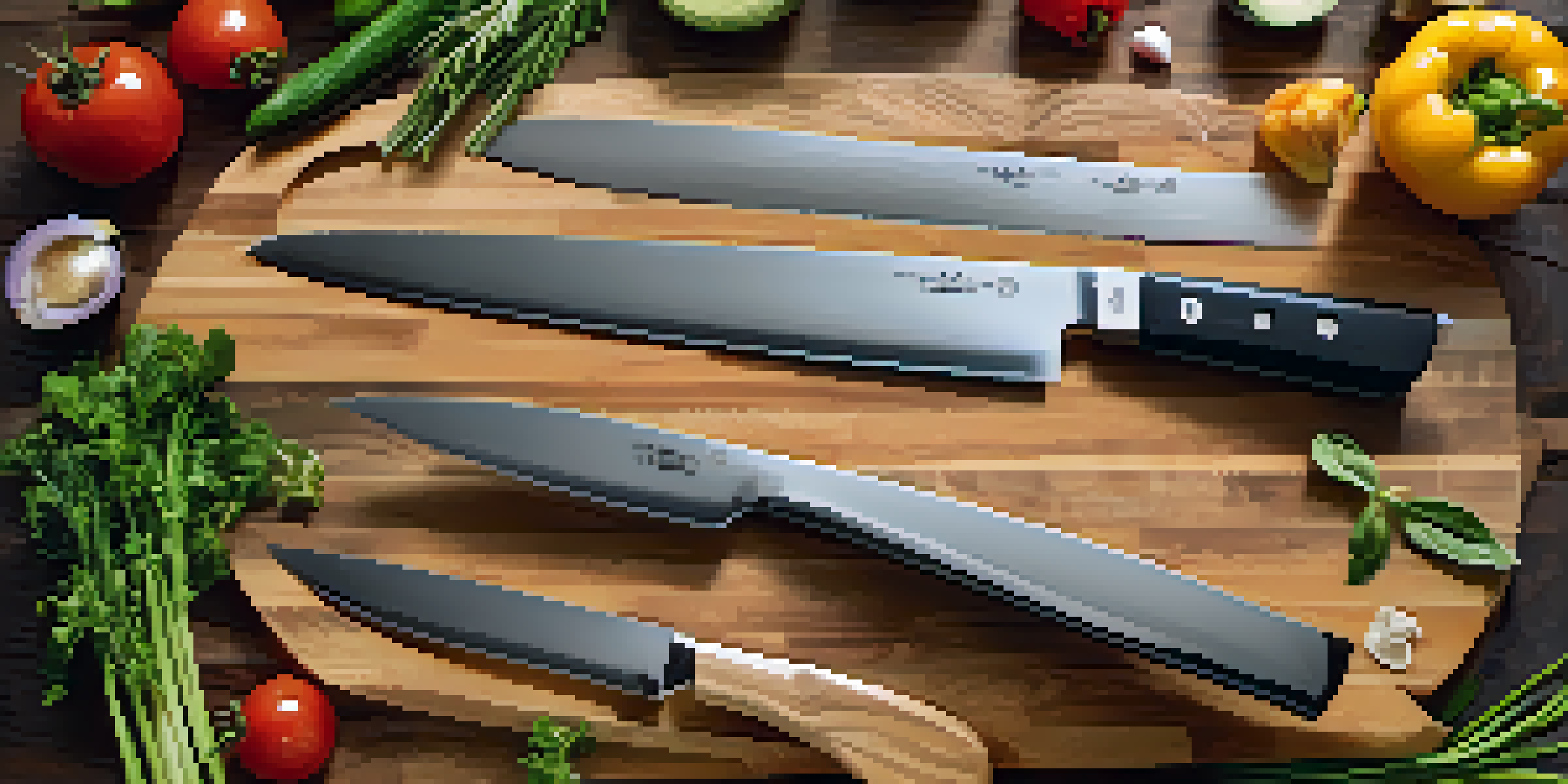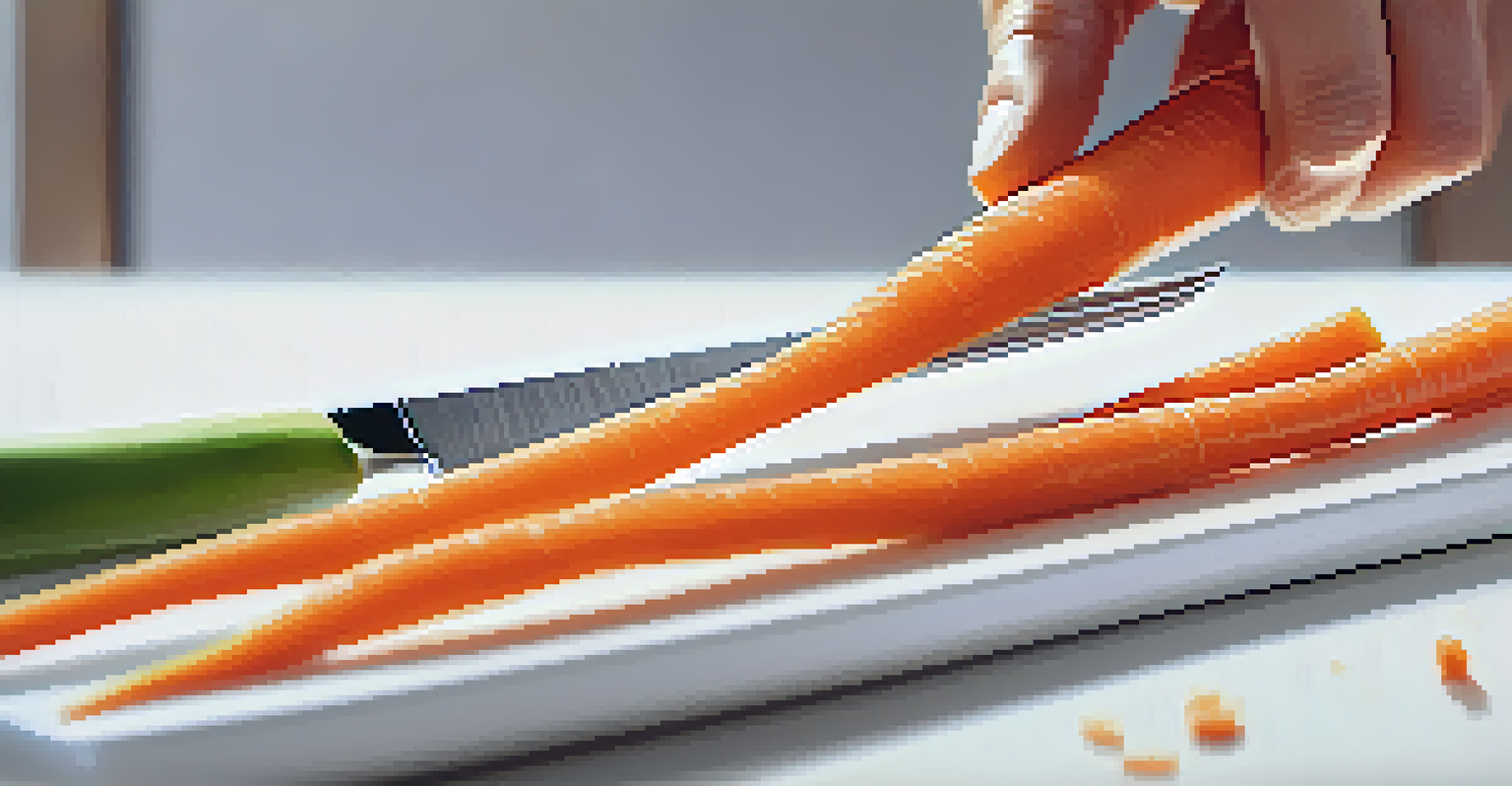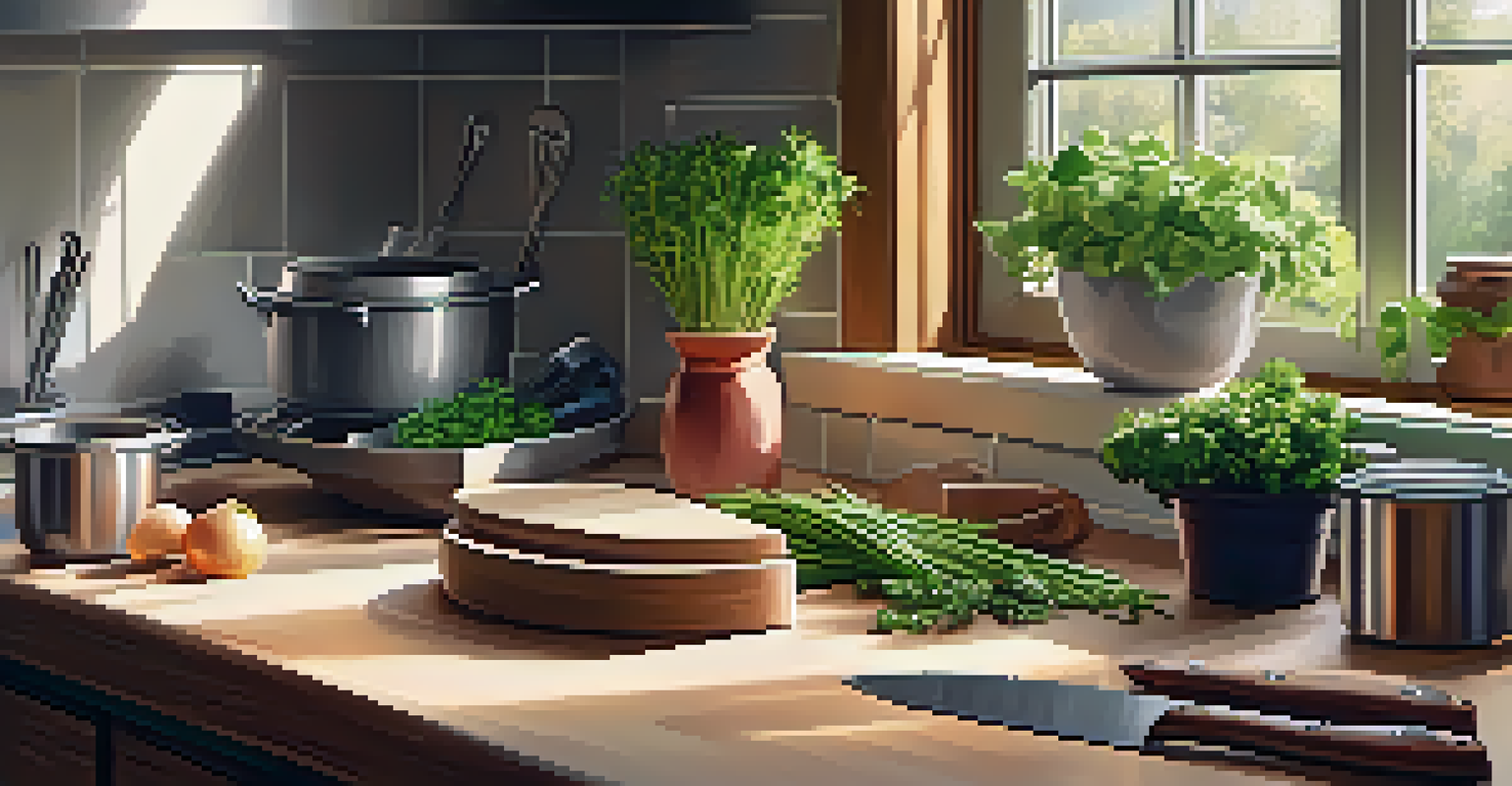Mastering the Knife: Essential Tools for Culinary Carving

Understanding the Importance of Knife Skills
Knife skills are fundamental in the kitchen, as they directly impact your cooking efficiency and the presentation of your dishes. Mastering how to hold a knife and execute basic cuts can elevate your culinary experience. Whether you're dicing vegetables or carving a roast, good knife skills lead to consistent results.
A knife is only as good as the hand that wields it.
Moreover, having the right knife for the job can make a world of difference. A well-sharpened knife not only enhances precision but also ensures safety by requiring less force. When you feel confident with your knife skills, you'll enjoy the cooking process more and create dishes that look and taste amazing.
In essence, investing time in honing your knife skills is just as important as investing in quality ingredients. It transforms cooking from a chore into an art form, allowing you to express your creativity while ensuring your meals are beautifully presented.
Essential Knives Every Cook Should Have
Every kitchen should be equipped with a few essential knives that cater to various tasks. The chef's knife, often considered the workhorse, is versatile enough for chopping, slicing, and dicing. A paring knife is perfect for delicate tasks like peeling fruits or deveining shrimp.

Don't overlook the importance of a serrated knife, which is ideal for cutting bread and tomatoes without squishing them. Each of these knives serves a unique purpose, and having them in your arsenal will make your cooking more efficient and enjoyable. Think of them as the paintbrushes of your culinary toolkit.
Master Knife Skills for Better Cooking
Developing good knife skills enhances cooking efficiency and presentation, making the culinary experience more enjoyable.
Investing in high-quality knives can enhance your cooking experience significantly. A good knife not only feels comfortable in your hand but also maintains its sharpness over time, making your prep work quicker and more enjoyable.
The Role of Knife Maintenance
Maintaining your knives is crucial for ensuring they last and perform at their best. Regular sharpening is key; a dull knife can be more dangerous than a sharp one as it requires more force to cut through food. Invest in a good sharpening stone or a professional sharpening service to keep your blades in prime condition.
The only thing a knife can do is cut; it’s the cook who makes it into a meal.
Cleaning your knives properly is also essential. Always hand wash them with mild soap and dry them immediately to prevent rust. Avoid putting them in the dishwasher, as the heat and moisture can damage the blade and handle.
Finally, store your knives safely to protect both the blades and yourself. Using a knife block, magnetic strip, or blade guards can help maintain sharpness and prevent accidents. A little care goes a long way in extending the life of your knives.
Exploring Specialty Knives for Culinary Precision
While a few essential knives can cover most tasks, specialty knives can take your culinary skills to the next level. For instance, a boning knife is designed to make removing bones from meat easier and more precise. Its flexible blade allows for intricate cuts that a regular chef's knife might struggle with.
Another example is the fillet knife, which is particularly useful for slicing fish. Its thin, flexible blade enables you to work around the bones and skin, ensuring you get the most out of your catch. Each specialty knife serves a distinct purpose, helping you achieve professional results in your kitchen.
Essential Knives for Every Kitchen
Equipping your kitchen with a few essential knives, like a chef's knife and a paring knife, can significantly improve your cooking tasks.
Investing in a couple of these specialty knives can greatly enhance your cooking repertoire. They’re like having the right tools for the job; they make complex tasks feel manageable and enjoyable.
Understanding Knife Cuts: Techniques for Success
Mastering different knife cuts can elevate your cooking and presentation. Basic cuts include julienne, brunoise, and chiffonade, each offering a unique texture and appearance to your dishes. Learning these techniques not only enhances your skills but also helps you create visually appealing meals.
For instance, julienned vegetables are perfect for stir-fries, while a brunoise cut can add elegance to sauces and garnishes. Practicing these cuts can also improve your efficiency in the kitchen, allowing you to prep ingredients faster and more uniformly.
Think of mastering knife cuts as learning a dance; once you get the rhythm down, everything flows beautifully. With practice, these cuts will become second nature, making you a more confident and capable cook.
Safety Tips for Using Kitchen Knives
Safety is paramount when working with knives in the kitchen. Always use a cutting board and ensure it’s stable before you start chopping. A slip on a cutting board can lead to accidents, so taking a few moments to set up your workspace properly can save you from injury.
Additionally, always cut away from your body and keep your fingers tucked in while holding food. This simple technique can significantly reduce the risk of accidental cuts. It's also wise to wear shoes in the kitchen to protect your feet from any dropped knives or falling objects.
Prioritize Knife Maintenance
Regular maintenance, including sharpening and proper cleaning, is crucial for keeping your knives in top condition and ensuring safety.
Lastly, never try to catch a falling knife; it's better to let it drop than risk injury. Remember, a little caution and awareness can go a long way in keeping your kitchen a safe space.
Choosing the Right Knife for Your Needs
Selecting the right knife can be overwhelming, especially with so many options available. Start by considering what types of foods you typically prepare. If you're a meat lover, a good chef's knife and a carving knife are essential. For someone who enjoys salads, a paring knife and a serrated knife would be more beneficial.
It's also worth noting that quality often trumps quantity. Instead of buying a large set of knives, focus on acquiring a few high-quality ones that feel comfortable in your hand. Trust your instincts when it comes to how a knife feels; it should feel balanced and solid.

Ultimately, the best knife is one that suits your cooking style and needs. Don't hesitate to try out various knives before making a purchase; a knife should feel like an extension of your hand, helping you create culinary masterpieces with ease.